
Larry Graham Jr. is an American bassist and baritone singer, both with the psychedelic soul/funk band Sly and the Family Stone and as the founder and frontman of Graham Central Station. In 1980, he released the single "One in a Million You", which reached the top ten on the US Billboard Hot 100. He is credited with the invention of the slapping technique on the electric bass guitar, which radically expanded the tonal palette of the bass, although he himself refers to the technique as "thumpin' and pluckin' ". In 1993, he was inducted into the Rock and Roll Hall of Fame as a member of Sly and the Family Stone. He is also the uncle of rapper Drake.

"Everyday People" is a 1968 song composed by Sly Stone and first recorded by his band, Sly and the Family Stone. It was the first single by the band to go to number one on the Soul singles chart and the U.S. Billboard Hot 100 chart. It held that position on the Hot 100 for four weeks, from February 9 to March 8, 1969, and is remembered as one of the most popular songs of the 1960s. Billboard ranked it as the No. 5 song of 1969.
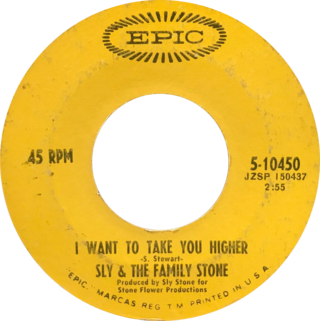
"I Want to Take You Higher" is a song by the soul/rock/funk band Sly and the Family Stone, the B-side to their Top 30 hit "Stand!". Unlike most of the other tracks on the Stand! album, "I Want to Take You Higher" is not a message song; instead, it is simply dedicated to music and the feeling one gets from music. Like nearly all of Sly & the Family Stone's songs, Sylvester "Sly Stone" Stewart was credited as the sole songwriter.

American singer Usher has released eight studio albums, ten compilation albums, eight extended plays, and 80 singles. His music has been released on the LaFace, Arista, Jive and RCA record labels. Usher has sold more than 23 million albums in the United States alone and over 65 million albums worldwide. With over 100 million total records sold worldwide, he is one of the best selling music artists of all time. He has nine Billboard Hot 100 number-one singles and 18 Hot 100 top-ten singles. In 1994, Usher released his self-titled debut album in North America, producing three singles that had moderate chart success, and the album sold more than 500,000 copies. His follow-up 1997 album My Way sold over 8 million copies worldwide, becoming his breakthrough album. It is certified seven-times platinum in the US, and spawned three successful singles, including his first UK number-one "You Make Me Wanna..." and first US Hot 100 number-one song "Nice & Slow". Usher's success continued in 2001 with his third studio album 8701. It debuted at number four on the Billboard 200. The album produced two number-one singles—"U Remind Me" and "U Got It Bad". In 2002, the album was certified four-times platinum in the US for sales of 4 million copies. As of 2010, its worldwide sales stand at over 8 million.

American singer Aaliyah has released three studio albums, two compilation albums, and 26 singles; She was born in Brooklyn, New York, and was raised in Detroit, Michigan. At age 10, she appeared on Star Search and performed in concert alongside Gladys Knight. At age 12, Aaliyah signed a deal with Jive Records and Blackground Records. During that time, she met R. Kelly through her uncle Barry Hankerson; eventually, he became her mentor, sole lead songwriter, and producer for her debut album. Released in May 1994, her debut album, Age Ain't Nothing but a Number, was certified double Platinum by the Recording Industry Association of America (RIAA) and sold three million copies in the United States. Months after the release of her album, Aaliyah ended her contract with Jive and signed with Atlantic Records due to allegations of an illegal marriage with Kelly.
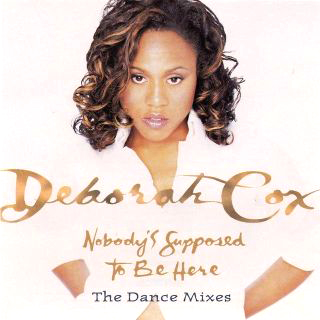
"Nobody's Supposed to Be Here" is a song by Canadian recording artist Deborah Cox, released as the lead single from her second studio album, One Wish (1998). Written by Montell Jordan and its producer, Anthony "Shep" Crawford, the song was released on the same day as the album, on September 15, 1998, by Arista Records. It is Cox's most successful song, peaking at number two on the Billboard Hot 100 for eight weeks and spending a then-record 14 weeks at number one on the Hot R&B/Hip-Hop Songs chart. In 2017, Billboard ranked the song at number five on its "Greatest of All Time Hot R&B/Hip-Hop Songs" chart.
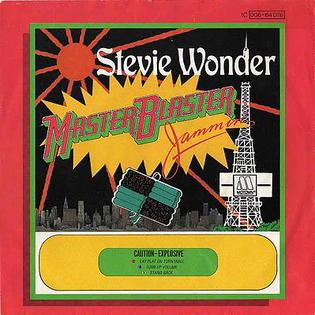
"Master Blaster (Jammin')" is a 1980 song by American singer-songwriter Stevie Wonder, released as the lead single from his nineteenth studio album, Hotter than July (1980). It was a major hit, spending seven weeks at number one on the US Billboard R&B singles chart, reaching number five on Billboard's pop singles chart in the fall of 1980 and peaking at number two on the UK Singles Chart, and number one in New Zealand.

"I'll Never Love This Way Again" is a song written and composed by English musician Richard Kerr and American lyricist Will Jennings, and first recorded by Kerr himself for his album Welcome to the Club as "I Know I'll Never Love This Way Again", released in November 1978. A version by Cheryl Ladd was released first on her self-titled album in July 1978. The song became a hit for American singer Dionne Warwick the following year, which was produced by her labelmate Barry Manilow for Warwick's Arista Records debut, Dionne. It was also recorded by British singer Cherrill Rae Yates before Warwick recorded and released her version of the song.

"Déjà Vu" is a hit 1979 ballad written by Isaac Hayes with lyricist Adrienne Anderson, recorded by Dionne Warwick for her album Dionne which Barry Manilow produced. The song won Warwick a Grammy Award for Best Female R&B Vocal Performance at the 22nd Grammy Awards.

"Ain't Nobody" is a song by American funk band Rufus and American singer Chaka Khan. It was released on November 4, 1983, as one of four studio tracks included on their live album, Stompin' at the Savoy (1983). "Ain't Nobody" quickly gathered popularity, and reached number one on the US Billboard R&B chart and number 22 on the US Billboard Hot 100. In 1984 at the 26th Annual Grammy Awards, "Ain't Nobody" won for Best R&B Performance by a Duo or Group with Vocal. It has become one of Khan's signature songs.

American singer Ciara has released seven studio albums, one extended play, one DVD, one promotional single, 54 singles and 28 music videos, including seven as a featured artist. She made her debut in 2004 with her debut album Goodies which debuted at three in the US and charted within the top 40 in several international markets. The album's title track peaked at number-one in the United States for seven weeks and gave the singer the title of "The First Lady of Crunk&B", while singles "1, 2 Step" and "Oh" reached the top three in the US. All three singles reached the top 10 in many international markets, with "Goodies" topping charts in the UK. Goodies was certified triple-Platinum in the United States, Platinum in Canada, and sold over five million copies worldwide. Ciara also participated in a number of successful collaborations, including US top five hits "Lose Control" with Missy Elliott, and "Like You" with rapper Bow Wow, as well as the US top 10 "So What" with group Field Mob.

"Something He Can Feel" is a song composed by Curtis Mayfield for the 1976 motion picture Sparkle. The song, a love ballad in a Chicago-/Philly-soul style, became a number-one hit on the Billboard's R&B singles chart in the United States twice with two separate recordings: a 1976 version by Aretha Franklin from the film's soundtrack, and a 1992 cover by girl group En Vogue.

"Hip Hop Hooray" is a song by American hip hop group, Naughty by Nature, released in December 1992 as the first single from their third album, 19 Naughty III (1993). The song spent one week at number one on the US Billboard Hot R&B/Hip-Hop Songs chart, and reached number eight on the Billboard Hot 100. It contains samples from "Funky President" by James Brown, "Don't Change Your Love" by Five Stairsteps, "Make Me Say it Again, Girl" by Isley Brothers, "You Can't Turn Me Away" by Sylvia Striplin and "Sledgehammer" by Peter Gabriel. Pete Rock made a remix that samples Cannonball Adderley's "74 Miles Away". It was certified Platinum by the RIAA and has sold over 1,100,000 copies in the United States.

American R&B singer Monica has released 8 studio albums, one extended play, and 48 singles. Since the beginning of her career in 1995, she has sold 5.3 million albums in the United States, In 1999, Billboard included her among the top twenty of the Top Pop Artists of the 1990s, and in 2010, the magazine ranked her 24th on its list of the Top 50 R&B and Hip Hop Artists of the past 25 years. With a career lasting over 20 years, Monica became the first artist to top the US Billboard Hot R&B/Hip-Hop Songs chart in the 1990s, 2000s, and 2010s.

"Sweet Thing" is a song performed by American funk and R&B band Rufus with vocals by band member Chaka Khan. As a single, it peaked number five on the Billboard Hot 100 chart in 1976. Mary J. Blige recorded her version, which charted in the United States and New Zealand in 1993.

"This Is for the Lover in You" is a song written by Howard Hewett, member of the trio Shalamar, and songwriter Dana Meyers. The track was originally recorded by Shalamar and appeared on their 1980 Platinum album, Three for Love.

American singer and songwriter Angie Stone has released ten studio albums, one compilation album, and more than two dozen singles. She has sold near five million records as a solo artist, including over 1.4 million albums in the United States. Stone's career began as a member of the hip hop trio The Sequence in the late 1970s. In 1999, she released her first solo album, Black Diamond on Arista Records. It debuted at number 46 on the US Billboard 200 and peaked at number nine on the Top R&B/Hip-Hop Albums, eventually selling more than 750,000 copies. Black Diamond was awarded gold by the Recording Industry Association of America (RIAA) and the British Phonographic Industry (BPI), and produced the singles "No More Rain ", "Life Story" and "Everyday", the former of which became a number-one hit on the Adult R&B Songs chart.
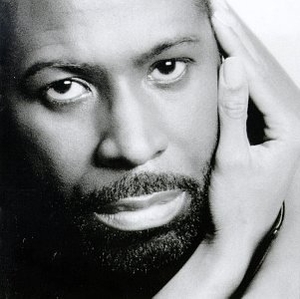
You and I is the thirteenth studio album by American singer Teddy Pendergrass. It was released on April 15, 1997, on Wind-Up Records. Pendergrass, who had a hand in writing and producing all the tracks except for the interlude, the title track and "One in a Million You", which was a cover of the 1980 Larry Graham song of the same name, consulted Terry Coffey, Dennis Matkosky, Jon Nettlesbey, and Jim Salamone to work with him on You and I.
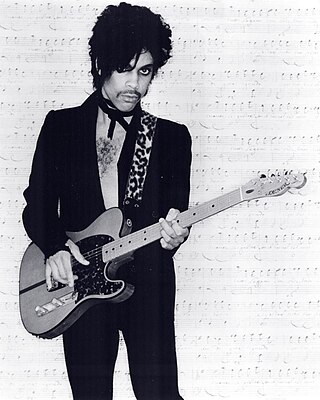
Prince released several hundred songs both under his own name and under pseudonyms and/or pen names, as well as writing songs which have been recorded by other artists. Estimates of the actual number of songs written by Prince range anywhere from 500 to well over 1,000. He has released 97 singles, 34 promotional singles, 21 internet singles, and eight internet downloads.

The singles discography of American rapper Jay-Z consists of 68 singles as a lead artist, and 51 singles as a featured artist, as well as 14 promotional singles.




















